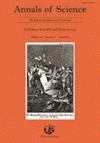Conceptualizing paradigms: on reading Kuhn’s history of the quantum
IF 0.9
3区 哲学
Q2 HISTORY & PHILOSOPHY OF SCIENCE
引用次数: 0
Abstract
ABSTRACT In this article, I discuss the criticisms raised against Thomas Kuhn’s Black-Body Theory. These criticisms concern two issues: how to understand Planck’s position with regards to the quantization of energy in 1901, and how to understand the book’s relation to The Structure of Scientific Revolutions. Both criticisms, I argue, concern the notion of a paradigm: the first concerns how Boltzmann acted as an exemplar for Planck, and the second whether the book provides a paradigm change. I will then argue that both criticisms presume a conceptualization of paradigms that does not align well with Kuhn’s conceptualization of it in both Structure and later work: they assume, more specifically, that sharing a paradigm presupposes sharing an interpretation of it, and that paradigm changes are essentially identical to gestalt switches. On the basis of this, I will then argue that the criticisms are misguided, that Kuhn’s position regarding Planck’s work is in fact quite close to the indetermination-view developed by some of his critics, and that the book fits Structure quite well. In conclusion, I will then reflect on how the narrative provided in Black-Body Theory connects with Kuhn’s views on the relation between history and philosophy of science.概念化范式——读库恩的量子史
摘要本文论述了对库恩的黑体理论提出的批评。这些批评涉及两个问题:如何理解普朗克关于1901年能量量子化的立场,以及如何理解这本书与《科学革命的结构》的关系。我认为,这两种批评都与范式的概念有关:第一种是关于玻尔兹曼如何作为普朗克的榜样,第二种是关于这本书是否提供了范式的改变。然后,我会争辩说,这两种批评都假设范式的概念化与库恩在《结构》和后来的作品中对其的概念化不太一致:更具体地说,他们假设共享范式的前提是共享对其的解释,范式的变化本质上与格式塔转换相同。基于此,我将认为这些批评是误导性的,库恩对普朗克工作的立场实际上与他的一些批评者提出的不确定性观点非常接近,这本书非常符合《结构》。最后,我将反思《黑体理论》中的叙述与库恩关于历史与科学哲学关系的观点是如何联系在一起的。
本文章由计算机程序翻译,如有差异,请以英文原文为准。
求助全文
约1分钟内获得全文
求助全文
来源期刊

Annals of Science
综合性期刊-科学史与科学哲学
CiteScore
0.80
自引率
0.00%
发文量
22
审稿时长
1 months
期刊介绍:
Annals of Science , launched in 1936, publishes work on the history of science, technology and medicine, covering developments from classical antiquity to the late 20th century. The Journal has a global reach, both in terms of the work that it publishes, and also in terms of its readership. The editors particularly welcome submissions from authors in Asia, Africa and South America.
Each issue contains research articles, and a comprehensive book reviews section, including essay reviews on a group of books on a broader level. Articles are published in both English and French, and the Journal welcomes proposals for special issues on relevant topics.
The Editors and Publisher are committed to supporting early career researchers, and award an annual prize to the best submission from current doctoral students, or those awarded a doctorate in the past four years.
 求助内容:
求助内容: 应助结果提醒方式:
应助结果提醒方式:


